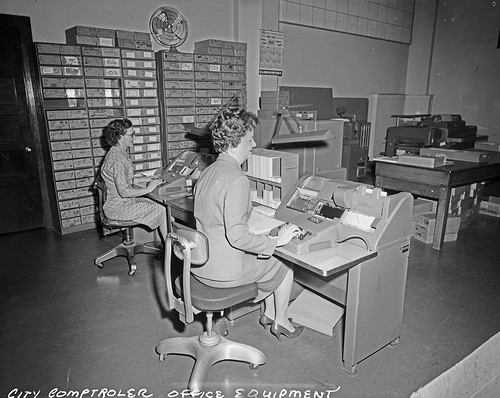In the Blog
5 scenarios where you need help at work, and how to ask: part 2

comptrollers office employees, 1960 Seattle Municipal Archives
2. You don’t know how to operate work-related technology or equipment.
Scenario: You’ve just sent 10 documents to the printer. The machine is old, there’s a paper jam. You open up the front door and there’s no paper to be seen. Ah-ha! There’s a little white corner of something in the back. You yank it out and now you have a scrap of paper in your hand, ink on your fingers, and something’s definitely stuck back there. Now your armpits are sweaty: Do you try to fix it on your own and stand the chance of taking on a hefty Xerox repair bill, or turn yourself in but risk perpetuating the stereotype that women are too vacuous to handle machinery and technology?
Despite being fairly adept at all things technology-related, Megan’s been flustered a few times by fancy staplers and office chairs. Cynara has packed upwards of ten thousand books for shipping, and has yet to fully unlock the achievement of smooth tape-gun operation. When it comes to entering new work environments (which you do regularly in your intern years), you’re always out to make a good impression–needing to ask how to get in the door (because your key pass doesn’t work) can make you feel like you’re Lucy in the chocolate factory, but trust us, these things are usually a million times more screwball in your head than in real life. (Unless you’re actually working in a 50s-era chocolate factory with someone named Ethel, in which case you might actually be trapped in an episode of I Love Lucy… ) It’s really not that bad!
Remember that everyone in your office went through the same newbie acclimation phase. We guarantee that at one time or another even the IT people in your office struggled to figure out how to circumvent the ghost-in-the-machine that causes the colour printer to default to double-sided.
You can’t control whether or not your co-workers will make sexist assumptions based on your gender presentation, but you can do your best to keep interactions on point and professional. Resist the urge to apologize when asking for help. A simple “Can you please show me how to [action verb] [office machine]” followed by a thank you, should get you what you need without implying you did something wrong by trying to educate yourself. No one will remember that you needed help operating the (seemingly intern-proofed) water cooler. The quality of your work will invariably eclipse these minor conversations.
3. You screwed up.
Scenario: You’ve been tasked with a project that demands a lot of attention to many small details. You’re focused on the big picture and the larger more pressing elements, and overlook a small, but necessary task like saving the last four hours of work on your document… And your word processor crashes. Everyone is really busy with other projects, but without help, you may not make one of your deadlines.
Until we’re replaced by robots programmed by other infallible robots, mistakes–aka proof you’re made of flesh and blood, instead of clockwork and lightning bolts–are bound to happen. The good news is, most minor to moderate errors are really very unlikely to destroy your career. Patriarchal work culture can make women feel like our jobs are precarious–especially in an office with men who often have different communication styles/ways of doing things*– and drive us to make poor decisions out of misplaced fear. Cynara, for example, once convinced herself it was more reasonable to try and elude library security, and pull an all-nighter in the university to try restore more than 70 pages of a corrupted book than to admit technological defeat to her boss. (Hint: Overnighters at work, especially at an office where they turn on motion-sensing alarms, are never the answer).
Hilary, a 20-something marketing communications professional and one of the most calm, level-headed (and succinct) women Cynara knows offers the following advice for handling getting a grip on on-the-job errors:
“1. Own it, but don’t self-flagellate. you have to take responsibility for a mistake, but you don’t have to grovel or wear a hair-shirt. Just be up front, apologize, and… 2. Have a plan. Know how you’re going to fix the mistake/or not make it in the future, and explain that to whoever you’re reporting to.”
Don’t panic, own-up, figure out what went wrong and how you can stop that from happening in the future. Accountability and a well-thought-out plan to avoid repeat occurrences will go a long way to reassure your employer (or future robot overlords) that you are mature, level-headed and capable.
*In Women Don’t Ask:The High Cost of Avoiding Negotiation–and Positive Strategies for Change authors Linda Babcock and Sara Laschever demonstrate that one of the side effects of a patriarchal culture that tends to equate ability with gender presentation is that women–even when they earn good grades, or receive compliments on their work– tend to feel as if they are “faking it.” This is also known as “Imposter Syndrome.”
Point your internet here tomorrow for our final installment in which we discuss the intern-vs-personal-assistant dilemma, and how to negotiate for the financial remuneration you deserve.



